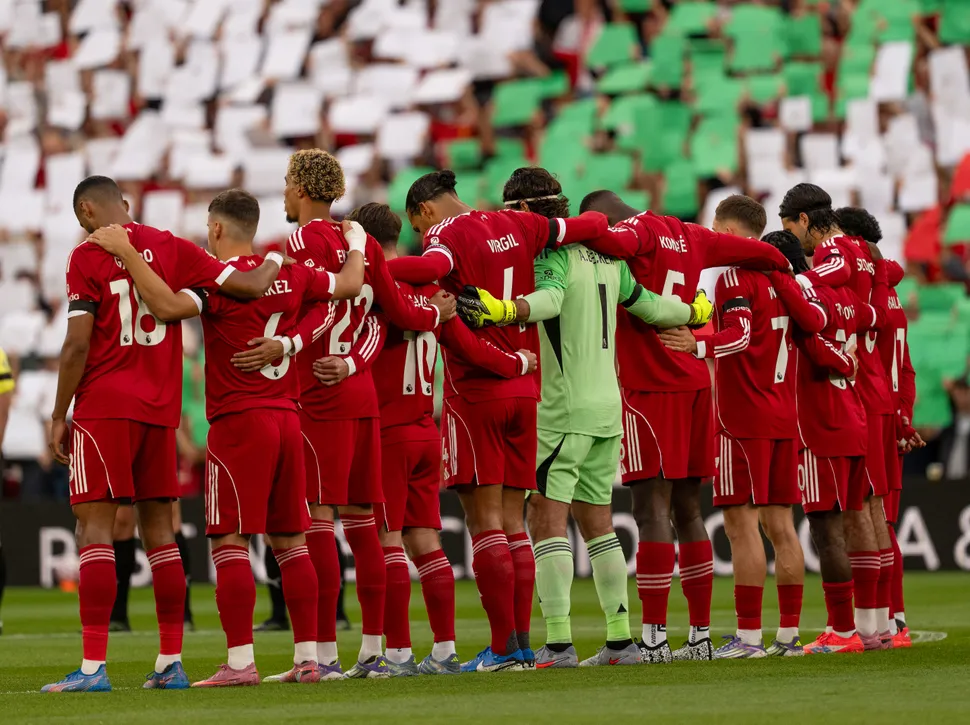Federico Chiesa’s Liverpool Journey: A Summer of Decision and Commitment

In a remarkable turn of events that has captured the attention of Liverpool supporters and football enthusiasts worldwide, Federico Chiesa, the talented Italian winger who joined Liverpool from Juventus, has made a definitive statement about his future at Anfield. According to renowned transfer specialist Fabrizio Romano, Chiesa and his representative have communicated directly with Liverpool’s hierarchy, expressing their unwavering commitment to remaining at the club for the upcoming season and beyond.
This development represents a significant shift in Chiesa’s stance, particularly given the widespread speculation that had surrounded his potential departure from Merseyside throughout the summer transfer window. The 26-year-old forward, who arrived at Liverpool with considerable fanfare and expectation, had reportedly been considering his options due to concerns about securing regular playing time in Jürgen Klopp’s successor’s tactical setup.
To understand the magnitude of Chiesa’s decision to remain at Liverpool, it’s essential to examine the circumstances that led to his initial uncertainty about his future at the club. When Chiesa made the move from Juventus to Liverpool, he arrived with a reputation as one of Italy’s most promising attacking talents, having played pivotal roles in both the European Championships and various high-profile club competitions.
However, the transition to English football and the Premier League’s unique demands proved more challenging than initially anticipated. The intense physicality, relentless pace, and tactical sophistication of English football presented Chiesa with obstacles that required significant adaptation. Additionally, Liverpool’s squad depth in attacking positions meant that securing a guaranteed starting position would require exceptional performances and consistency.
The competition for places in Liverpool’s forward line is particularly fierce, with established stars and emerging talents all vying for limited spots in the starting eleven. This competitive environment, while beneficial for the team’s overall quality, created uncertainty for Chiesa regarding his role and the amount of playing time he could realistically expect. Such concerns are not uncommon for players transitioning between leagues and adapting to new tactical systems and coaching philosophies.
Chiesa’s initial consideration of a potential departure was reportedly driven by his desire to secure regular first-team football, a natural concern for any professional athlete at the peak of their career. The summer transfer window presented numerous opportunities for players seeking new challenges or more prominent roles at different clubs across Europe’s major leagues.
However, as the transfer window progressed and various potential destinations were explored, it became increasingly clear that the grass might not necessarily be greener elsewhere. The global football transfer market in recent years has become increasingly complex, with financial fair play regulations, inflated transfer fees, and limited availability of truly attractive destinations for players of Chiesa’s caliber.
Many clubs that might have been interested in acquiring Chiesa’s services either lacked the financial resources to meet Liverpool’s valuation or were unable to guarantee the regular playing time that had initially motivated his consideration of a move. This reality check played a crucial role in Chiesa’s eventual decision to recommit to his Liverpool project.
One of the most significant factors in Chiesa’s change of heart has been Liverpool’s evolving tactical approach under their current management structure. The club’s coaching staff has demonstrated remarkable flexibility in adapting their systems to maximize the potential of their squad members, including Chiesa.
The Italian winger’s versatility has become increasingly apparent to the coaching staff, who have identified multiple ways to integrate his unique skill set into Liverpool’s tactical framework. Chiesa’s ability to operate effectively on either flank, his pace and directness in one-on-one situations, and his experience in high-pressure European competitions make him a valuable asset for various tactical scenarios.
Liverpool’s recent tactical evolution has also created new opportunities for players like Chiesa to contribute meaningfully to the team’s success. The club’s approach to rotation and squad management has become more sophisticated, recognizing that success in modern football requires depth and quality throughout the entire squad rather than relying solely on a fixed starting eleven.
The involvement of Chiesa’s agent in communicating the player’s decision to remain at Liverpool highlights the professional and mature approach taken to resolve the situation. In modern football, agents play crucial roles in facilitating clear communication between players and clubs, ensuring that all parties understand expectations, concerns, and future plans.
Chiesa’s agent likely conducted thorough discussions with both the player and Liverpool’s management to address the initial concerns about playing time and role within the squad. These conversations would have covered various aspects of Chiesa’s integration into the team, including tactical roles, development plans, and long-term career objectives.
The fact that both Chiesa and his representative felt confident enough to make such a definitive statement about remaining at Liverpool suggests that satisfactory assurances were provided regarding the player’s future role and importance to the club’s plans. This level of clarity and commitment from all parties bodes well for Chiesa’s continued development and contribution to Liverpool’s objectives.
Chiesa’s decision to remain at Anfield has significant implications for Liverpool’s squad planning and strategic approach for the upcoming season and beyond. The retention of a player of Chiesa’s quality and international experience strengthens the club’s attacking options and provides additional tactical flexibility for various competitions.
Liverpool’s participation in multiple competitions throughout the season requires considerable squad depth, and Chiesa’s commitment ensures that the club maintains high-quality options across different attacking positions. His presence in the squad also provides healthy competition for other attacking players, potentially raising the overall performance level of the entire forward line.
From a financial perspective, Chiesa’s decision to stay also represents sound business for Liverpool. The club can now focus their transfer resources on other areas of the squad that may require strengthening, rather than seeking a replacement for a departing Chiesa while potentially accepting a lower transfer fee than his true market value.
Chiesa’s decision reflects broader trends in modern football regarding player retention and development. Increasingly, successful clubs are focusing on creating environments where talented players want to remain and develop their careers, rather than constantly cycling through squad members.
Liverpool’s approach to player development and integration appears to be paying dividends, with Chiesa’s commitment serving as an example of how clubs can address player concerns through clear communication, tactical adaptation, and long-term planning. This approach not only benefits individual players but also contributes to squad stability and continuity.
From a purely football perspective, Chiesa’s decision to remain at Liverpool opens up numerous tactical possibilities for the team’s coaching staff. His pace and directness offer different attacking dimensions compared to other squad members, providing options for various match situations and opposition types.
Chiesa’s experience in international football, including major tournaments with Italy, brings valuable mentality and big-game experience to Liverpool’s squad. These intangible qualities often prove crucial in decisive moments throughout long and demanding seasons.
His ability to contribute both in terms of goals and assists, combined with his work rate and defensive contribution when required, makes him a complete modern winger who can adapt to different tactical requirements within the same match or across different competitions.
With Chiesa’s future at Liverpool now secured, attention turns to how he can maximize his impact during the upcoming season. The Italian international will be eager to demonstrate that his decision to remain was the correct one, both for his personal development and for Liverpool’s competitive ambitions.
The upcoming season presents numerous opportunities for Chiesa to establish himself as a key contributor to Liverpool’s success. His experience and quality should prove valuable across all competitions, from domestic league matches to high-stakes European encounters.
Chiesa’s commitment also sends a positive message to Liverpool supporters, demonstrating that quality players see Anfield as an attractive destination where they can achieve their career objectives while contributing to collective success.
Federico Chiesa’s decision to remain at Liverpool, communicated clearly through proper channels with his agent’s involvement, represents a positive resolution to what could have been a disruptive summer saga. The Italian winger’s change of heart, influenced by evolving transfer market conditions and Liverpool’s tactical development, demonstrates the importance of patience and clear communication in modern football relationships.
This outcome benefits all parties involved: Chiesa maintains his position at a prestigious club with genuine ambitions for major honors, Liverpool retain a talented and versatile attacking option, and supporters can look forward to seeing more of an exciting player who brings different qualities to the team’s attacking arsenal.
As the new season approaches, Chiesa’s renewed commitment to Liverpool provides optimism for both his personal development and the club’s collective objectives. His journey from uncertainty to commitment exemplifies how professional football relationships can evolve positively when all parties approach challenges with openness, flexibility, and shared ambition for success.















